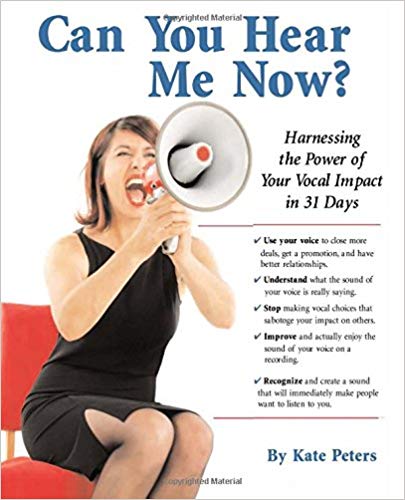To Find Your Voice You Have To Use It
A voice is more than the way you sound when you speak and there is more to finding your voice than going through some scales to work the muscles of the larynx or learn to breathe. The singers and speakers we love have distinct voices that display unique characteristics (think James Earl Jones) or voices that stand out in the crowd. How did they get that way? Were they born with voices like that or did they have to find them? In the case of James Earl Jones, he was a stutterer and spent a lot of work and time to find his voice. And once he found he could speak without stuttering, was he automatically the voice of Darth Vader? How did he find the voice that made him the voice of CNN?
A Google search on “find your voice” delivered more than a million results. Surprisingly, few of them were related to the physical voice. In fact, many were related to areas such as writing, psychology, the visual arts, and social change. But I believe it’s all the same; those who are looking to find their voice in the world or in the arts or politics have to go through similar discovery and exercise to have a voice that has impact. And, no, I am not saying that you have to sing scales to be a writer. But what I am saying is that if you want a voice that others will hear or if you don’t like the one you have or if you want to form a perspective that will be reflected in your work, you have to start with the voice you’ve already got. The real question to ask is “How do I shape my voice it will be heard in this noisy world?” Here’s how:
- Play with sounds and/or ideas,
- Take some chances, and
- Don’t let anyone shut you down.
Play with sounds, play with ideas, colors
As a singer or speaker, you have to try out your sounds. Babies do this when they learn to speak. Mine did it to learn to sing when they were tiny. Adults can learn from babies. Adults can play with sound until they get something that works to communicate and that they like to produce. We also learn from others, such as coaches or role models, or we can create something new.
Just as singers experiment with sounds to find something that expresses how they feel, you need to develop your own ideas or style and get feedback from others to develop your voice in the world. Find a role model or a group in which you can try out your ideas while learning from others. Examine your ideas. Shape them into something you want to share with others. Play with them. Challenge them. Challenge others. Ask questions and seek the answers.
Step out and take chances
I started singing in front of others when I was very young. I sang in church and at school until I eventually sang in competitions, plays, operas, concerts, etc. Singing in front of others is never the same as singing at home. It allows us to learn and grow more because we get feedback. Leadership guru, Ken Blanchard, said: “Feedback is the breakfast of champions.” It nourishes. Singers and speakers perform in public to get that feedback.
One way to take your metaphorical voice out in public is to play devil’s advocate with someone. To do this, try defending or arguing the side of the argument with which you DON’T agree. Or paint a piece in a new style. Or create a new format for a poem. In doing this, you get clearer about what is true for you and you also get clearer about how others may respond to your voice. If you want to do challenge yourself if this way, take a look at this wiki. Then take a chance and speak up at the next meeting, or write that book, or find a show for your art.
Don’t let anyone shut you down
Sometimes you get good feedback and sometimes you don’t. Some people are uncomfortable with their physical voice because of negative feedback about their singing or speaking they got when they were young. That’s sad, but true. When someone tells me that they are tone-deaf, I ask if they were encouraged to sing as a child, and nine times out of ten they tell me a parent shut them down.
The same is true for your other voice. You have to play with ideas in order to formulate your own, and there are always people who are ready to tell you that your ideas/drawings/solutions are stupid. I was lucky. I grew up in a home where discourse was served along with dinner every night. I didn’t always like the arguments that ensued, but I did develop beliefs and perspectives that were my unique view of the world and I got comfortable sharing them. But there are many who are silent simply because they let someone tell them they were wrong or no good at what they were attempting.
The final truth about finding your voice:
You do have a voice. Everyone does. In fact, it’s unique because there is no other voice with exactly the same physical makeup, perspective, history, and development as yours. In other words, you don’t have to find it because you didn’t lose it; but if you don’t use it, you WILL lose it. And the world will be poorer for its absence.
To learn more:
- On Entrepreneur.com How to Find your Passion in 5 Creativity Exercises
- Toastmasters is a great place to learn to speak up
- Is there a Million Dollar Voice for CEO’s?
- To see how others are using their voices for good, here’s a compilation of my Raise Your Voice posts
How are you using your voice and what do you recommend to others? Please share in the comments below. Or find me on Twitter, Instagram, or LinkedIn and we will continue the conversation there.
Connect with us on LinkedIn
Connect with the author on LinkedIn
Photo 143052 © Mikael Andersson – Dreamstime.com
Photo 132736317 © Wachira Khurimon – Dreamstime.com
© Galina Barskaya | Dreamstime Stock Photos







